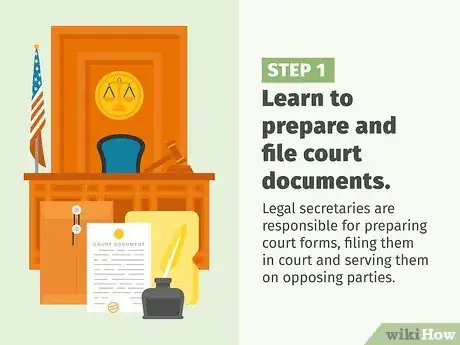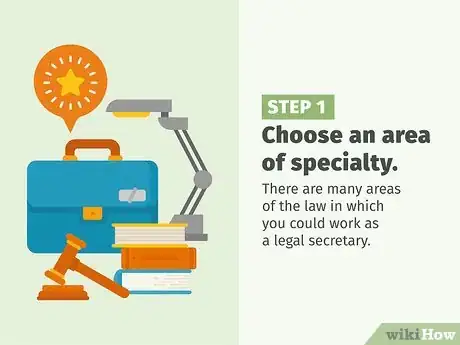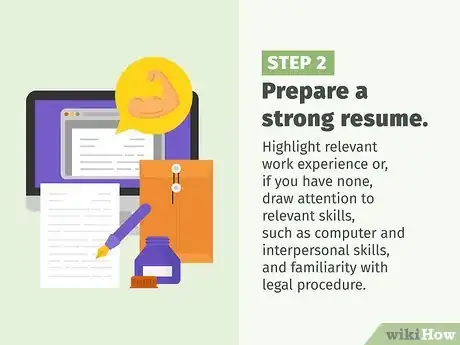This article was co-authored by Clinton M. Sandvick, JD, PhD. Clinton M. Sandvick worked as a civil litigator in California for over 7 years. He received his JD from the University of Wisconsin-Madison in 1998 and his PhD in American History from the University of Oregon in 2013.
wikiHow marks an article as reader-approved once it receives enough positive feedback. In this case, 100% of readers who voted found the article helpful, earning it our reader-approved status.
This article has been viewed 76,639 times.
Legal secretaries assist attorneys with a variety of duties, from administrative tasks to the preparation of legal documents. There are many settings in which a legal secretary can work, including law offices and government agencies. Legal secretaries can also specialize in particular areas of the law, such as real estate law, family law and criminal law. To become a legal secretary, one must acquire the right qualifications, including education and work experience, and build relevant skills.
Steps
Acquiring the Right Qualifications
-
1Get the proper training. A high school education or the equivalent is usually all that is required to become a legal secretary. However, to increase your marketability, consider seeking additional training.[1]
-
2Gain work experience.[4]
- Select a secretarial training program that arranges for short term internships with attorneys. [5]
- Contact small law firms to ask about internships or short term employment opportunities.
- Once you have been placed in a legal office, ask to assist a paralegal. This will provide you with the ideal training to become a legal secretary by teaching you to draft legal documents and file them in court.
- If you cannot get training in a law office, look for other opportunities to gain administrative experience.
Advertisement -
3Become a notary public. Though not required for the job, becoming a notary public will help you stand out from other candidates. This is because law offices need notaries on hand to notarize legal documents.[6]
- The application process to become a notary varies from state to state, but generally requires that you be at least 18 years of age, a resident of the state and that you complete a notary training program or test.[7]
Building Your Skill Set
-
1Learn to prepare and file court documents. Legal secretaries are responsible for preparing court forms, filing them in court and serving them on opposing parties. [8]
- Become familiar with a variety of legal documents, including briefs, subpoenas, complaints and proofs of service.
- Memorize the deadlines for filing court documents. Missing a deadline can be considered a default in favor of the opposition.
- Become acquainted with court filing fees.
-
2Hone your computer skills.[9]
- Practice typing. Large law firms usually require a legal secretary to be able to type 65-80 words per minute, while a government entry level job may accept a slightly lower speed (around 45-50 words per minute).
- Learn to navigate software programs, such as Microsoft Word, Excel and PowerPoint.
-
3Improve your writing and grammar. Legal secretaries are expected to write letters and legal documents from dictated tapes or handwritten notes. They must also proofread documents prepared by attorneys and paralegals.[10]
- If you are not confident in basic grammar and spelling, consider taking a writing class.
- Study legal terms likely to come up in your job so that you understand them when you are asked to write about them.
-
4Develop a professional demeanor. As a legal secretary, you will be expected to regularly interact with clients, attorneys, and co-workers in a professional manner.[11]
- Practice expressing yourself clearly and politely.
- Buy clothing appropriate for a formal office environment.
-
5Learn to retrieve court decisions on online legal databases. Some legal secretaries are expected to retrieve court decisions from online legal databases, like LexisNexis and Westlaw. These websites are subscription-based and expensive to access on an individual basis.[12] However, there may be opportunities, either at your legal secretary course or at an internship, for you to learn the basic search functions of these cites.
- When looking up a case, keep in mind that the citation must include the volume, reporter designation and page number.
Applying for Jobs
-
1Choose an area of specialty. There are many areas of the law in which you could work as a legal secretary. The major distinction is between civil and criminal law, but within civil law there are narrower areas of specialty, including corporate litigation, real estate, contracts, employment. In thinking about which would be the best fit for you, consider your interests and the type of environment in which you would like to work.
- If you like the idea of working for the government and for the public interest, you may like working for a District Attorney or Public Defender's Office.
- If you like meeting people from other countries, a small immigration firm might be a good fit.
- If you are interesting in earning a high salary and do not mind stress, consider working for a corporate law firm.
-
2Prepare a strong resume.[13]
- Tailor your resume to the work done by the particular employer. If, for example, you took a training course in filing documents in criminal court and you are applying for a job with a criminal defense firm or Public Defender's Office, include the course prominently on your resume.
- Highlight relevant work experience or, if you have none, draw attention to relevant skills, such as computer and interpersonal skills, and familiarity with legal procedure.
-
3Contact a temp agency. Once you know the area of the law in which you would like to work, a temp agency can help place you in available jobs in that field.[14]
- Though temp jobs are not ideal in terms of salary or benefits, they are a great way for you gain work experience and network with employers.
-
4Be strategic in where you look for permanent jobs. Finding an entry-level job when you do not yet have experience can be challenging. For this reason, it is important that you be strategic in choosing employers more likely to hire brand new legal secretaries.[15]
- Target solo practitioners and small firms. Smaller firms, consisting of one or two attorneys, are more likely to accept you with less experience.
- Apply for government jobs. Though government jobs pay less than large corporate firms, the provide an excellent opportunity for new legal secretaries to break into the job market.
Warnings
- If you are interested in being a legal secretary, you should strongly consider getting a paralegal certificate. The employment prospects for legal secretaries have dimmed as attorneys type their own briefs and other secretarial tasks become automated.[16]⧼thumbs_response⧽
References
- ↑ http://www.legalsecretaries.org/career_guidance.html
- ↑ http://study.com/legal_secretary_training.html
- ↑ http://study.com/legal_secretary_training.html
- ↑ http://study.com/legal_secretary_training.html
- ↑ http://www.legalsecretaries.org/career_guidance.html
- ↑ https://www.universalclass.com/i/course/legal-secretary-training.htm
- ↑ https://www.asnnotary.org/?form=faqs
- ↑ http://www.legalsecretaries.org/career_guidance.html
- ↑ http://www.legalsecretaries.org/career_guidance.html
- ↑ http://www.legalsecretaries.org/career_guidance.html
- ↑ http://www.legalsecretaries.org/career_guidance.html
- ↑ http://www.legalsecretaries.org/career_guidance.html
- ↑ http://coverlettersandresume.com/legal/entry-level-legal-secretary-resume-no-experience/
- ↑ http://www.legalsecretaries.org/career_guidance.html
- ↑ http://www.legalsecretaries.org/career_guidance.html
- ↑ http://www.wsj.com/articles/SB10001424127887323689204578569920585692346
About This Article
To become a legal secretary, start by completing your high school education or getting your GED. Additionally, enroll in a legal secretary certificate program, pursue your Associate’s Degree, or take online courses in paralegal studies and secretarial skills to make yourself more marketable. Next, gain work experience by finding an internship at a small law firm or get a job assisting a paralegal. As you build your skill set, learn to prepare and file court documents and become familiar with retrieving court decisions on online legal databases. To learn how to apply for jobs as a legal secretary, keep reading!











































































